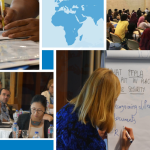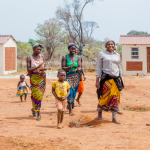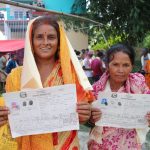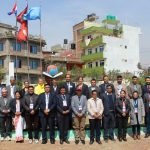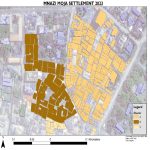 Deadline for Submissions: 28th February 2014
Deadline for Submissions: 28th February 2014
First Prize: US$ 4,000
Second Prize: US$ 2,500
Third Prize: US$ 1,500
INFORMATION, TERMS AND CONDITIONS
1. OBJECTIVES OF THE COMPETITION
The Competition on Good Practices to Improve Security of Tenure in the Muslim World aims at documenting and deepening the global knowledge on approaches, initiatives and projects that increased security of tenure in Muslim contexts, with special consideration to the poor, the women, and the youth. Papers that document experiences that provided a positive impact on the communities and that could be replicated and institutionalised are of particular interest, as it is the intention of the organisers to bridge the gap between theory and practice. The objectives of the
competition are:
- Documenting good practices and lessons learned on tenure security in the Muslim world;
- Encouraging knowledge development and capacity development on good land practices;
- Identifying innovative tenure security tools and approaches to be further developed and tested;
- Identifying land rights champions (individuals and organisations) in the Muslim world.
2. THEMES OF THE COMPETITION
The overall theme is ‘how specific land projects, practices and approaches used in Muslim contexts (including Muslim communities in non-Muslim majority countries) have proven effective in providing security of tenure to the poor, the women and the youth’. The linkages with the satisfaction of housing and livelihood needs, as well as the realisation of human rights, poverty reduction, economic prosperity and sustainable development in Muslim Communities are aspects clearly liked with this topic. GLTN is particularly interested in the following sub-themes:
- Sustainable urbanisation and efficient use of urban, peri-urban and rural land;
- Enhancing the housing, land and property rights of women, children, youth, elder persons,
- minorities, displaced population, etc;
- Security of tenure for disadvantaged groups (e.g. through waqf, collective or group rights,
- Islamic land tenures, etc);
- Practices that deal with land fragmentation and improve the productivity of land (urban and
- rural);
- Approaches supporting good land governance;
- Documentation of land readjustment experiences;
- Practices conciliating Islamic land law, custom, and statutory provisions (within legal pluralism);
- Islamic finance for land development;
3. ELIGIBILITY
The competition is open to all individuals interested in contributing. People of all nationalities, backgrounds, gender, faith and age groups are encouraged to participate. There is no formal education qualification or affiliation required to enter the competition, as the only condition is abiding by the rules of the competition, including granting UN-Habitat / GLTN the intellectual property of the papers submitted.
Submissions can be done individually or by teams of individuals. Where relevant, the organisational or institutional affiliation will be acknowledged. It is the responsibility of participants to credit all of their partners in the case they submit. All named authors are considered as equal contributors, and equally entitled to the rewards of the competition, regardless of the seniority of the team members.
4. FORMAT FOR THE SUBMISSIONS
Submissions should be done in Word, using the specified headers as shown in Annex 1 below. Some fields must be filled, while others are not compulsory. The papers should contain between 4,000 and 10,000 words; submissions falling out of this word range will be disqualified. Submissions can be made in English, Arabic or French. Participants are encouraged to submit their papers in English. French or Arabic submissions will be translated into English by the organizers of the competition. Papers should be sent by email to the GLTN Secretariat at the following address: gltn@unhabitat.org with copy to ombretta.tempra@unhabitat.org.
5. CONDUCTING THE COMPETITION
GLTN has over 55 partners from among leading international organisations, institutions and networks representing different stakeholders. The competition is a joint project of GLTN partners UN-Habitat, the International Islamic University of Malaysia, and the University of East London. These partners will receive and record the submissions, facilitate the appointment of a 9-member Jury, shortlist the submissions, communicate with participants / enquiries, inform the awardees and organise the award ceremony and the publication of the best submissions. The jury will be inclusive and comprise of experts representative by gender, region and other criteria.
6. PRIZES
Three prizes of US$4,000, US$2,500 and US$1,500 will be awarded for the three best papers that record impactful, innovative and scalable tenure security initiatives that made a difference in the lives of the poor, the women and the youth in Muslim contexts. Certificates of Merit will also be awarded by UN-Habitat and GLTN to Prize winners and those shortlisted. Further, prize winners could be invited to present their papers at UN-Habitat / GLTN conferences, publish their papers in the UN literature, and be involved in the further development of the work submitted.
7. TERMS AND CONDITIONS
Every participant will be required to sign the front sheet indicating that they agree with the rules and conditions of the competition, which are as follows:
- There will be no fees charged for submission or at any stage in the competition.
- Failure to comply with any rules, terms and conditions of the competition may result in the participant’s disqualification.
- UN-Habitat holds the intellectual property rights for all materials submitted by the participants for the competition. Copyright of the outputs produced through the competition will be owned by UN-Habitat. Participants agree that to have their material possibly published by GLTN in any form, with due acknowledgement.
- Only those entries received within the deadline will be considered.
- UN-Habitat or competition organisers will not be responsible for submitted material lost in transit.
- All material submitted must be participants’ own work.
- Any kind of plagiarism is strictly prohibited and will lead to disqualification of participants. Duplication of the thoughts or work of another source must be referenced.
- All participants shall agree to allow their names and photographs to be used for publicity purposes by GLTN during and after the competition.
- The judges’ decision is final and no appeals will be entertained.
ANNEX 1 – TEMPLATE FOR SUBMISSION
- Abstract (max. 200 words – to be written last);
- Title of the good practice documented;
- Name(s) and contact(s) of the author(s);
- Location of the intervention;
- Duration;
- Partners involved;
- Beneficiaries/impact
- Main message(s) coming out of the case study documented;
- How can it be up-scaled / replicated
- Challenges encountered
- Innovative features
- Potential for poverty alleviation
- Recommendations
- Bibliography/Literature Review (optional).
Get the submission template in Word format here: English || French
CONTACTS
For any additional information please contact the GLTN Secretariat at gltn@unhabitat.org, with copy to ombretta.tempra@unhabitat.org
Other Downloads
- Click here to view the flyer
- Call for papers English || French || Arabic


